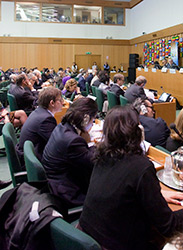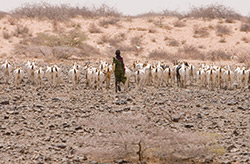Toward a vision, mission and roadmap

The Global Framework for Action to Cope with Water Scarcity in Agriculture in a Changing Climate (in short Global Framework for Water Scarcity in Agriculture) currently has thirty five partners from research institutions, think tank organizations, global partnerships, the United Nations and international agencies. The first Meeting of Partners took place on 19-20 April 2017 in Rome, Italy.
The Meeting of Partners agreed on the following Vision, Mission, Objective and Guiding Principles:
Vision: a world whose food systems are secure and resilient to increasing water scarcity in a changing climate.
Mission: to support measurable, significant and sustainable progress on improving and adapting agricultural systems in conditions of increasing water scarcity and a changing climate, using the combined expertise and resources of its partners.
Objective: to urgently address the following important and relevant work areas at international and country levels:
- Advocating for political prioritisation
- Cooperating on work programmes
- Sharing and disseminating knowledge and experience
- Developing new or improved solutions
- Promoting sustainable and integrated water resources management
- Building capacity of partners and countries and other stakeholders
- Contributing to consistent monitoring systems
The guiding principles: Partners and stakeholders working towards a common goal, with success determined by the commitment of each one.
- Dialogue is facilitated across a broad range of actors and sectors, and diverse parties are aligned around the common vision.
- Partners and stakeholders realize mutual benefits from the process through win-win agreements, and in so doing learn from each other.
- Equity and inclusiveness are assured for all partners.
- Transparency and accountability are ensured through agreement on leadership mechanisms, including who participates in decision-making, and on rules and modalities of cooperation.

Partners and participants also agreed that the Global Framework would be aligned to the Global Priorities where the activities of the Global Framework will contribute to achieve/implement the Agenda 2030 and the Sustainable Development Goals (SDGs), the Climate Change Agenda and support to country priorities within the (Intended) Nationally Determined Contributions (INDCs), National Adaptation Plans (NAPs) and other relevant development plans, programmes and projects.
An Interim Steering Committee consisting of 14 members, with a Chair and Deputy Chair, was established with representatives from the following constituencies:
- National governments;
- UN agencies;
- Research and academia/education; and
- Civil society and membership organizations.
A joint Rome Statement on Water Scarcity in Agriculture was adopted by the partners stressing the importance of coherently coping with water scarcity for food security and climate change adaptation and mitigation.
FAO is fully committed to the Global Framework including the use of its wide network of offices and national partners, offering a conducive environment for implementations under the Global Framework. FAO is also providing the facilities and staff for the Support Unit of the Global Framework.
The Terms of Reference of the Global Framework were discussed at the meeting and are currently being reviewed by the Steering Committee.
Activities that will form part of the Work plan of the Global Framework were also proposed by Partners. It is being finalized with contributions from Partners.
